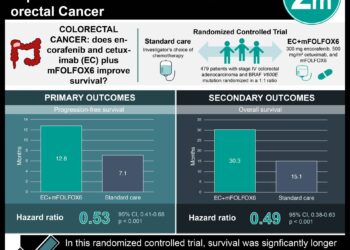Early-life body size not an independent risk factor for colorectal cancer
1. Greater early-life body size is not an independent risk factor for colorectal cancer (aside from distal colon cancer) but is rather a risk factor confounded by greater body habitus in adulthood.
Evidence Rating Level: 2 (Good)
Early-life adiposity is a known risk factor for chronic disease, including colorectal cancer. However, it is unclear whether this risk exists independent of adiposity later in life, especially when considering the long latency period of colorectal cancer. Therefore, this multivariable Mendelian randomization (MR) study employed known genetic variations associated with self-reported early life body size and measured adult body size, to better elucidate this association with colorectal cancer. This study used data from 125,478 individuals of European descent participating in a UK Biobank genome-wide association study (GWAS). These participants self-reported their body size at 10 years old (thinner, plumper, or about average), and measured their body mass index as adults. Then, both univariable and multivariable MR analyses were performed to identify the total and independent associations respectively of early and adult body size on colorectal cancer. The results showed that for the univariable analysis, genetic variants associated with early-life body size increased the risk of some colorectal cancers, such as colon cancer (OR per category change of 1.16, 95% CI 1.00-1.35) and distal colon cancer (OR 1.25, 95% CI 1.04-1.51), but was not significant for colorectal cancer overall (OR 1.12, 95% CI 0.98-1.27). In the multivariable analysis, the direct association between early body size and cancer risk were attenuated for colorectal (OR 0.97, 95% CI 0.77-1.22) and colon (OR 0.97, 95% CI 0.76-1.25) cancers, but not for distal colon cancer (OR 1.27, 95% CI 0.90-1.77). However, the direct association between adult body size and cancer risk were increased for colorectal (OR 1.27, 95% CI 1.03-1.57), colon (OR 1.32, 95% CI 1.05-1.67), and proximal colon cancer (OR 1.57, 95% CI 1.21-2.05). Overall, this study demonstrated that aside from distal colon cancer, increased early-life body size is not an independent risk factor for colorectal cancer, and but is a risk factor confounded by persisting elevated body habitus in adulthood.
Click to read the study in BMC Medicine
Image: PD
©2023 2 Minute Medicine, Inc. All rights reserved. No works may be reproduced without expressed written consent from 2 Minute Medicine, Inc. Inquire about licensing here. No article should be construed as medical advice and is not intended as such by the authors or by 2 Minute Medicine, Inc.







